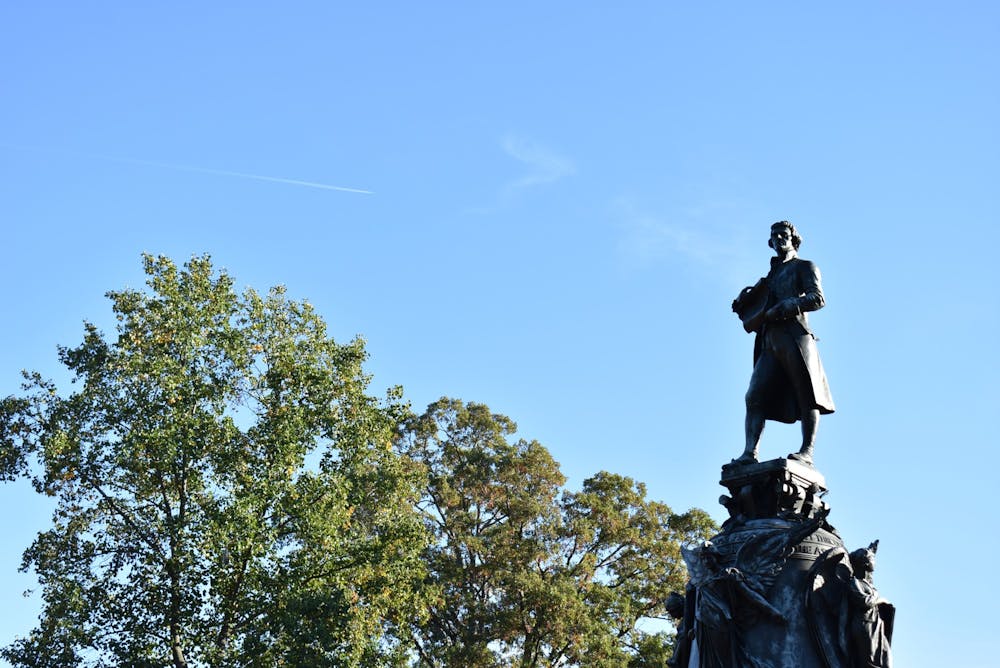Rector Whitt Clement reaffirmed the University’s commitment to its founder Thomas Jefferson at a recent meeting of the Board of Visitors, stating that “honoring his legacy and his contributions to our nation has, and will always be, an indelible part of what it means to live, learn and work here.” This statement stood out to me due to the way it conceives of what it means to honor someone. This is complicated, and Clement is right to admit that “Jefferson’s legacy is not so fragile that it cannot withstand an honest reflection on the fullness of his life.” To me, honoring someone means to revere them — inherently deflecting criticism. While practicing a critical history is no easy task, I find it necessary all the same. With respect to Jefferson, those who seek to complicate a glorified view of the University’s founder are not seeking to disassociate entirely from Jefferson, but instead, to meet him head on. Contextualizing the history of Jefferson is a good start, but reckoning with the past requires making amends with history. Intellectual diversity requires an abundance of views on Jefferson, not solely rose-tinted ones. A greater reflection on what honor truly means is necessary before progress can be made.
Many who seek to praise Jefferson often claim that we cannot judge the man through the morals of our time as enslaving people was simply the practice of the 18th century and most of the founders did the same. Just as we better understand history with more knowledge and varying accounts, applying modern morals to the past is a fact we cannot escape, as our perspective shapes what narratives we form when looking to the past. But still, even during the Revolutionary era, Jefferson fell behind his colleagues who were active in the abolitionist movements like Ben Franklin. Similarly, the same argument is often used to claim that monuments to the Confederacy were just a product of their time as a means of obscuring them from their white supremacist origins or cover up the fact that they were a focal point for the neo-Nazis who came to Charlottesville.
When it comes to Jefferson himself, it is hard to deny the revolutionary potency of his political philosophy. There is obviously a great deal of praise for the Declaration of Independence or the Virginia Statute for Religious Freedom. Despite the good in Jefferson’s work, there is a deep hypocrisy of his actions lying beneath the inspiring words. To enslave people while proclaiming the equality of all men is paradoxical. In acknowledging the legacy of Jefferson’s work on equality — as Board member Bert Ellis would like us to — we must recognize the Declaration as well as Jefferson’s failure to choose to live up to the morals of said document. We don’t need to give leeway to Jefferson, who knew enslavement was wrong, but continued to practice it anyway.
Another key idea of Jefferson’s focused on reforming the Constitution in line with new generations — an idea that goes directly against those who seek to blindly hold onto tradition. Creating a scare around the need to “reverse the path to ‘wokeness’” on Grounds by halting projects like contextualizing Jefferson’s legacy ignores this important area of Jefferson’s ideals and that very legacy. To deny that the views of the student body and the people at large have changed is to take a reactionary position that goes against every value an academic institution should uphold. Being a radical does not mean falling back on the values of the past — it means pushing ever forward in the name of knowledge and for the benefit of the people. Measures as light as those taken by the University administration to contextualize Jefferson are nothing in the grand scheme of his legacy.
With all of the fearmongering from Ellis, reckoning with Jefferson is more necessary than ever. While the Jefferson Council — which Ellis is president of — may claim that the University was a “more intellectually vibrant place” when Ellis was a student, his denial of the Queer Student Union’s request to co-sponor gay rights speaker Frank Kameney says otherwise. Student-guided tours — which the Council complains are too “woke” — represent a new high point of students encouraging each other to think about multiple perspectives when it comes to Jefferson. If challenging the status quo of a venerated figure to the University does not represent diversity of thought, then it is not entirely clear what the Jefferson Council actually desires other than blind allegiance to this University’s founder.
Contextualizing the legacy of Jefferson is a good first step, but it is still just that. Founder’s Day should be seen as more than just a day to praise Jefferson but a day to be critical of his mistakes and failures as well. One day, a statue of Jefferson might not stand in front of the Rotunda. To me, such a change would not be getting rid of Jefferson. We will not lose sight of the founding of this University if Jefferson does not tower over us. His legacy will not be forgotten, and he will be remembered for what he was — all of what he was — without the need for glorification. This is the difference between honor and critical understanding. To place a figure on a literal pedestal is to think of them in an uncritical light. Doing so deifies people who were simply human and goes against any sort of commitment to truth that Jefferson himself surely believed in. History will move on and be sure to remember the past out of necessity for understanding the present and preparing for the future.
Ryan Lanford is an Opinion Columnist for The Cavalier Daily. They can be reached at opinion@cavalierdaily.com.
The opinions expressed in this column are not necessarily those of The Cavalier Daily. Columns represent the views of the authors alone.







